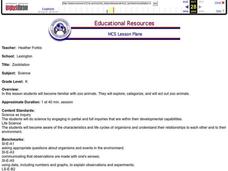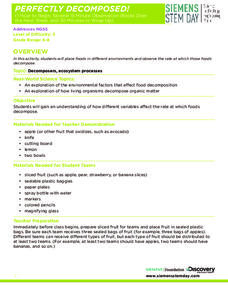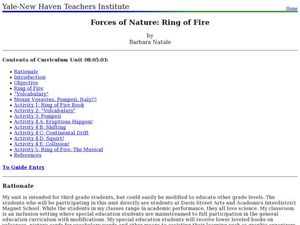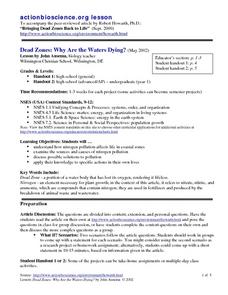Cornell University
Bacteria Take Over and Down
Bacteria outnumber all other forms of life on Earth. Scholars observe the growth of bacteria in petri dishes to understand their role in maintaining good health. Then, they observe the growth of bacteria after they introduce...
Curated OER
The Trial of the Bloody Sucker
A blood sucking what? Grade schoolers identify the characteristics of blood sucking parasites. They organize their information, identify their arguments, and present them to the class in persuasive arguments. They participate in a debate...
Curated OER
Survival in Antarctica
Explore the harsh climate of Antarctica and its wildlife. Participate in experiments to determine how humans survive in the continent's climate, and address the difficulties faced by scientists.
Curated OER
Bioluminescence 2009: Living Light on the Deep Sea Floor Expedition - Now You See Me, Now You Don't
Young scholars examine bioluminescence and camouflage of deep sea creatures. In this deep sea creatures lesson, students investigate the visible and near-visible light spectrum. They work in small groups to complete a light, color, and...
Curated OER
Changing Planet: Withering Plants - Stressing Over Lost Water
Expectant earth scientists examine the bottom side of a leaf and learn the role of the stomata. They consider the gas exchange that occurs through these structures and relate how the climate is changing to its impact on food crops. This...
University of California
Energy and Biomass Pyramids
Young scientists play tag as they act out the food pyramid in the ocean ecosystem. Energy circles pass from the smaller prey to the predators and at the end of the activity, a data chart and analysis questions allow pupils to apply their...
University of Minnesota
Dendritic Spines Lab
This is your brain on drugs ... literally! Your neuroscientists-in-training examine the evidence of drug use on the human brain and how neurons change their connectivity when altered by drugs. They then work together to create testing...
University of Minnesota
What's the Deal? Addiction Card Game
Addiction is a big deal! Playing a game of cards helps learners understand the concept of addiction. Through their analysis, they examine the potential for addiction and how it varies for each individual.
Curated OER
Zoobilation
Youngsters become familiar with zoo animals. They sort them into categories, and choose an animal to act out. Two zoo centers are created in the classroom that have examples of the animals for the pupils to play with. Then, they choose...
Curated OER
The Very Hungry Caterpillar
Here is a good lesson on butterflies and caterpillars. After listening to The Very Hungry Caterpillar, young learners put cards that depict the life cycle of a butterfly in the correct order. There are some good ideas for center...
Curated OER
Amounts of Dissolved Oxygen in Various Bodies of Water
Students test water to determine the dissolved oxygen content while displaying the proper use of testing instruments while visiting water testing sites. They determine if the amount of dissolved oxygen is appropriate for the tested...
Curated OER
What is Biotechnology?
Young consumers explore the concept of biotechnology as it pertains to the foods they eat, economics, and agriculture. They watch several videos, explore a website, complete worksheets, and engage in class discussion. Son they'll know...
Science Friday
Fossil Detectives
What can this rock be? Pupils pretend to be paleontologists by sketching fossils and making predictions about their types. To determine whether they can identify the type of dinosaur, class members compare their observations and...
Curated OER
In Touch with Apples
Students read "How To Make an Apple Pie and See the World", the story of a girl who traveled the world to find the ingredients to make her apple pie. They conduct a series of interdisciplinary activities including testing their senses,...
Curated OER
5 Step Food Chain Lesson
Have your class discuss food chains using this resource. Learners watch a presentation on the food chain and how we are dependent on the smallest life forms. They write newspaper articles and create an illustration describing the food...
Curated OER
Readings in Hudson River Natural History
Reading and understanding informational text is a key element to understanding every discipline. Elementary learners read three different articles focused on various animals and habitats in the Hudson River. They answer comprehension...
Curated OER
Stained Glass Flowers
Elementary and middle schoolers create decorative flowers using wire armatures and a special paint that remains flexible when it dries. The results from this project are stunning, but the materials needed may be tough to track down. An...
Curated OER
The Five Classes of Vertebrates
What a terrific lesson plan! Learners discuss the animal kingdom, and classify them as vertebrates and invertebrates. They also identify them as fish, amphibians, reptiles, birds, and mammals. There is even a taxonomic breakdown of...
Discovery Education
Perfectly Decomposed!
We all know someone who won't eat the banana with a brown spot, the grape with a dimple, and the apple with a bruise. Scholars use different fruits to explore what happens when fruits really start to decompose. They set up an experiment...
Curated OER
Forces of Nature: Ring of Fire
Third graders will research the Ring of Fire and be able to share their findings with their partner. They will also demonstrate volcanic eruptions using a baking soda and vinegar volcano model. Then they will discover how continental...
NOAA
Understanding Food Chains and Food Webs
Jump into an exploration of marine ecosystems with the first lesson in this four-part series. After first learning about crustaceans, mollusks, and other forms of sea life, young marine biologists view a PowerPoint presentation that...
Science 4 Inquiry
Introducing the Types of Energy
Young scientists explore many different types of energy including light, heat, nuclear, sound, potential, and more. They match the types of energy and identify when energy transfers from one type to another.
Curated OER
Life in the Crystal Palace
Marine biologists research sea ice communities. Assign some groups to construct paper models of sea ice communities in winter, and some to construct models of them in summer. The instructional activity is simplistic, but the Internet...
Curated OER
Dead Zones: Why Are the Waters Dying?
Students investigate the effects of pollution on marine ecosystems. They read and discuss an article, identify the effects of pollution on marine life, conduct research on local nutrient pollution, and conduct local water quality studies.

























